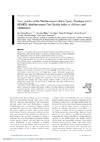Identificador persistente para citar o vincular este elemento:
https://accedacris.ulpgc.es/jspui/handle/10553/44826
| Título: | Food, youth and the Mediterranean diet in Spain. Development of KIDMED, Mediterranean Diet Quality Index in children and adolescents | Autores/as: | Serra-Majem, Lluís Ribas, Lourdes Ngo, Joy Ortega, Rosa M. García, Alicia Pérez-Rodrigo, Carmen Aranceta, Javier |
Clasificación UNESCO: | 32 Ciencias médicas 3206 Ciencias de la nutrición 3212 Salud pública |
Palabras clave: | Dietary habits Mediterrnean diet Children Spain |
Fecha de publicación: | 2004 | Publicación seriada: | Public Health Nutrition | Resumen: | Objective: To evaluate dietary habits in Spanish children and adolescents based on a Mediterranean Diet Quality Index tool, which considers certain principles sustaining and challenging traditional healthy Mediterranean dietary patterns.Design: Observational population-based cross-sectional study. A 16-item Mediterranean Diet Quality Index was included in data gathered for the EnKid study (in which two 24-hour recalls, a quantitative 169-item food-frequency questionnaire and a general questionnaire about socio-economic, demographic and lifestyle items were administered).Setting: Spain.Subjects: In total, 3850 children and youths aged 2-24 years residing in Spain.Results: Of the sample, 4.2% showed very low KIDMED index results, 49.4% had intermediate values and 46.4% had high index results. Important geographical differences were seen, with subjects from the Northeast showing the most favourable outcomes (52% with elevated scores vs. 37.5% of those from the North). Lower percentages of high diet quality were observed in low socio-economic groups, compared with middle and upper income cohorts (42.8%, 47.6% and 54.9%, respectively). Large cities had more positive results and only slight variations were seen for gender and age.Conclusions: The KIDMED index, the first to evaluate the adequacy of Mediterranean dietary patterns in children and youth, confirms that this collective is undergoing important changes, which makes them a priority target for nutrition interventions. Results challenge certain commonly perceived notions tied to income level, population size and diet quality. | URI: | https://accedacris.ulpgc.es/handle/10553/44826 | ISSN: | 1368-9800 | DOI: | 10.1079/PHN2004556 | Fuente: | Public Health Nutrition [ISSN 1368-9800], v. 7, p. 931-935 |
| Colección: | Actas de congresos |
Citas SCOPUSTM
1.074
actualizado el 08-jun-2025
Citas de WEB OF SCIENCETM
Citations
1.097
actualizado el 15-feb-2026
Visitas
238
actualizado el 15-ene-2026
Descargas
876
actualizado el 15-ene-2026
Google ScholarTM
Verifica
Altmetric
Comparte
Exporta metadatos
Los elementos en ULPGC accedaCRIS están protegidos por derechos de autor con todos los derechos reservados, a menos que se indique lo contrario.
